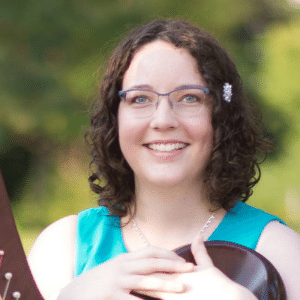The information in this article is based on research and also on the personal experiences of musicians with mental illness, including the author. This article is not intended as medical advice and should not be used in place of consulting a medical professional.

Between one-third and one-half of professional musicians have recently experienced symptoms of a mental illness. I am one of them.
I knew very little about mental illness before my own experience, but I have found as I talk to other musicians about it, many of them have also experienced symptoms or know someone else who has. Because mental illness is so prevalent among musicians (see sidebar on opposite page), I believe it is valuable for all musicians to learn about and talk about how mental illness affects us. For me, the music community around me (especially my teachers and my harpist friends) is one of the biggest reasons I was able to find a path to recovery. I wouldn’t be able to play the harp today if I hadn’t had other musicians who were kind and supportive when I was struggling the most.
My story
I know firsthand how important it is to live in a music community that supports, rather than isolates, those who live with a mental illness.
Near the end of high school, I had a series of difficult life stressors. Two of my grandparents passed away within less than three months. My dad lost his job immediately afterwards, and my family had to move on short notice. As a result, my depression and anxiety became strong enough that I began to notice it. I had trouble eating and I lost weight, and I cried often. I thought it was understandable to feel this way after experiencing so much stress. I went to counseling and started medication, but it didn’t seem to help much—as I later found out, I needed a different kind of therapy and a different set of medications.
During my first year away from home, as an undergraduate in Toronto, Canada, my relationships with roommates and classmates were often strained. I got good grades and practiced a lot, but I often didn’t make eye contact with friends at school because I didn’t want to waste too much time saying hi. Sometimes I lost my sense of direction, especially if I was anxious. Once during orientation, I met with some classmates inside a mall and tried to find the exit on my own afterwards. I became disoriented and ended up walking a circle all the way around the mall, back to where I started. When I finally did get out on the sidewalk, I couldn’t figure out which direction I was facing, nor did I realize that I could have used the navigation app on my phone. I had to call my parents and even then had trouble communicating where I was so they could help me find my way home.
Late that next summer, I came back to school to get ready for the coming academic year, and I had a psychotic break. I remember being in my apartment one night terrified to leave my room because I thought something bad might happen if I did. My parents drove all the way to Toronto and brought me home to Minnesota. I don’t remember it, but apparently I kept saying “I’m Heather” all the way home. I think I wanted to reassure them (and myself, perhaps) that I was still me, still the person they knew, even though I didn’t understand what was happening to me. Once we got home, I remember lying on the couch screaming and moaning. It was so painful inside—and there was nothing I could do about it, nor any explanation for why my life felt so different. My family took me to many doctors and mental health professionals, but I still had no answers, until one of my therapists recognized that I needed a greater level of care than she could offer. She referred me to an outpatient day program, where I met a psychiatrist who was able to diagnose my condition as bipolar I. After learning about bipolar, I realized that what I had been experiencing were the symptoms of bipolar disorder, a mental illness that can include mania (which includes racing thoughts, grandiose and delusional beliefs, and risky behavior), depression, mixed states (simultaneous symptoms of mania and depression), and psychosis (losing touch with reality).
Much of the next two or three years of my life is fuzzy in my memory. It feels as if I lost those years. Even today, if I try to say how old I am and I give my first knee-jerk reaction instead of thinking through the math, my answer is often two or three years too young. But I do remember some of the ways my mental illness affected my harp playing. I had been playing pedal harp for several years, but I sometimes couldn’t read a pedal diagram. Were sharps on top? In the middle? On the bottom? I didn’t know anymore. I also had difficulty memorizing music; at one point it seemed like I wouldn’t ever be able to memorize music again.
I had to learn much easier repertoire for a couple years to adapt to my cognitive abilities at that time. My technique was much worse than before; I pulled sharply down on the strings and often played with my hands in a claw-like position. My forearms and shoulders were so tense that they hurt when I was done practicing; for a while I wore athletic tape on my forearm so it didn’t feel as sore.
My musicianship also changed. I was unable to keep a steady tempo, but I wasn’t aware of it. In the music I learned during my year of medical leave and then my second year of school, I had to write everywhere: “don’t rush, don’t drag.” I also had to highlight every dynamic marking in yellow; otherwise I simply didn’t see it on the page.
Through it all, my music teachers were gracious enough to continue teaching me. They accepted me in the state I was in, without making me feel guilt or rejection for experiencing a mental illness I could not control. They didn’t give up teaching me lessons and continued to believe that recovery was possible for me. They patiently helped me reduce my physical tension, relearn my technique, and refocus my attention when my racing thoughts during mania distracted me from the music. They made accommodations (such as allowing me to play from the score for my second-year recital, since I was unable to memorize that year), working with my school administration, doctors, and family members to understand what I needed.
My teachers were also very gentle in how they interacted with me—how they spoke and moved. During my lessons, they asked me how I was doing, how my friendships were, and how school was going, and then took time to listen. At least a couple times, I remember that their empathetic listening relaxed my tense arms enough to make my tone sound warmer when I played the harp afterwards.
Reflecting on this experience later, I realized that our mental and emotional state is inseparable from who we are and what we do as musicians. I know firsthand how important it is to live in a music community that supports, rather than isolates, those who live with a mental illness. Now, through medication, psychotherapy, and a strong support network, I am able to manage the symptoms of my mental illness so that I can thrive in my music career and in my daily life. I still experience some symptoms (including trauma symptoms at times), but I have learned ways to manage and reduce them, and I have learned to live with my illness.
Awareness
The month of May has been observed as Mental Health Awareness Month in the United States since 1949. I’m sharing my story in this May-June issue to help raise awareness because, as musicians, we are very likely to encounter colleagues and students who live with a mental illness. We can all play a part in someone else’s recovery journey. While most musicians are not (and should not try to be) medical professionals, showing empathy and acceptance goes a long way to help people who are often ostracized and isolated because of their illness. Because of my music teachers’ one-on-one mentoring relationship with me, they were able to play a key role in supporting my mental health. As a music student and professional musician, what I have learned about managing a mental illness gives me the tools to support both myself and my peers in living the best life possible.
In the rest of this article, I will share some practical ways to support musicians with mental illness. Several of these ideas come from my doctoral research project focusing on the importance of the teacher-student relationship for music students with mental illness, which included interviews with other musicians who live with mental illness, as well as information from academic journals, books, and other sources.
For students
If you’re a music student who lives with a mental illness, it might be scary to ask for help. But chances are, if you have a caring music teacher, you can trust them to do their best to meet your needs. They’ll want to know if there’s something they can change that would help you learn, feel calmer and more comfortable in lessons, or have more fun playing music, for example.
Be honest with your harp teacher; tell them how you’re doing and what you need this week, in this lesson. Letting them know what’s going on will help them realize that you aren’t making excuses or procrastinating; you genuinely need extra time or an alternate perspective on something before you can move forward. Here are some examples of questions you might consider asking your harp teacher to advocate for yourself:
- I struggled to stay focused and motivated to practice this week because my depression has been a little worse recently. Can we make a practice plan together for next week, and find some ways I could bring more joy into my practice sessions? Is there something we can work on that I can still learn in my lesson this week, even though I wasn’t able to practice as much?
- I tend to feel like a failure because my mental illness affects my self-esteem. Would you be willing to point out some of the little ways I’ve improved in the last couple weeks? Can we work on noticing them together so I can practice seeing the positive aspects of my playing?
- Every time I sit down to play this piece, I get anxious and tense up. How can I practice this to unlearn that tension?
In some situations, you might not feel comfortable explaining the reason for your question. That’s okay. Just identify for yourself what would help you manage your mental illness, and then ask your teacher for whatever ideas, adjustments to expectations, or other changes you feel you need.
For teachers
If you’re a harp teacher, one of the most helpful things you can do is also the simplest: show empathy. Tell your students upfront, repeatedly, that you are there to support them, and if there is something they need—musically, mentally, emotionally—you will listen and help, or refer them to someone who can. Let your students know that lessons are a safe space; you care about their wellbeing, and you know that mental and emotional obstacles can get in the way of music-making just as easily as physical ones.
You can also take practical steps to proactively anticipate students’ needs. Here are some examples:
- Check in with students at the beginning of each lesson. Ask them, “How was your week? How are you doing?” If you know the student well enough, you might say, “How are you doing—really?”
- If you’re noticing a lot of tension in a student’s playing, pause and take a few deep breaths together.
- If you notice a prolonged change in your student’s mood, or if a student who used to be highly motivated suddenly seems to be apathetic about their progress, talk to the student or their parents and say, “I noticed this change and was concerned about it because I care about my students’ wellbeing. Is there something going on? How can I help you in your lessons?”
- Be open to providing referrals to mental health professionals. Have a list ready that you can provide to students. If you teach on a college campus, find out what mental health programs are available and list out their contact information. If you teach a private studio, list a few self-screening tools and helpline numbers (including the National Suicide Prevention Lifeline at 988), and an organization like the National Alliance on Mental Illness (nami.org) that provides resources for finding treatment.
For musicians
If you’re a musician who lives with a mental illness, don’t be afraid to seek community and talk with other musicians about your struggles and the ways you’re overcoming them. Six lifestyle adjustments can help you effectively manage your symptoms and stabilize your mood:
- seek treatment (including therapy and medication)
- establish a routine
- get good sleep
- practice good nutrition
- exercise regularly
- find social connection and a support network
For all harpists, you can encourage other musicians living with mental illness by listening to their stories empathetically, without arguing or judging. Tell your friend or colleague that seeking treatment is an act of strength, not weakness. Offer to find help together if your friend is too overwhelmed to look up contact information. Reassure them that you’ll be alongside them to support them. Share that you know many other musicians live with mental illness and are on a journey of recovery, and you have hope that they too will find their path to recovery.
If you want to learn more about mental illnesses and how you can take care of yourself and others, the National Alliance on Mental Illness (nami.org), the National Institute of Mental Health (nimh.nih.gov), and Mental Health America (mhanational.org) are great resources. I have compiled a more detailed list, including helpline phone numbers, books, apps, and toolkits, on my website at heathercorneliusharp.com/mental-illness-and-music/. •






